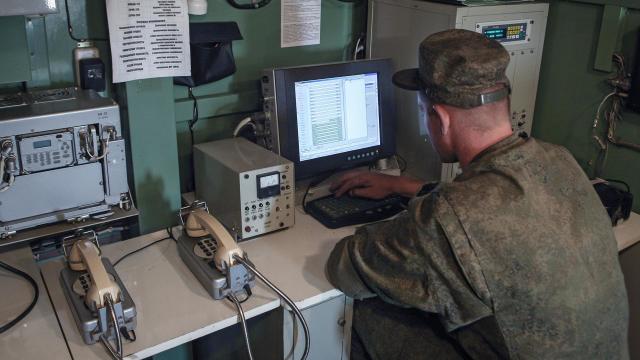- Joined
- Feb 26, 2019
- Messages
- 12,449
- Points
- 113
'They're Jamming Everything': Putin's Electronic Warfare Turns Tide of War

As Russian forces push for territorial gains in eastern Ukraine, they're turning to a military capability they've largely forgone during the war but is expected to give them an edge: electronic warfare.
After earlier failing to topple Ukraine's government, Russia's military has focused its offensive on the country's eastern Donbas region, which is home to a large population of Russian speakers. New reporting shows Russian forces are increasingly intercepting the Ukrainian military's communications while jamming navigation and guidance systems.
"They are jamming everything their systems can reach," an official with the Aerorozvidka, a Ukrainian agency that develops unmanned aerial vehicles and other military capabilities, told the Associated Press in a report published Friday.
Russia has jammed GPS receivers on drones used by Ukrainian forces used to locate and fire artillery at enemy targets, according to the report.
Christian Brose, a former aide to Senator John McCain and author of The Kill Chain, recalled a story from a Ukrainian officer who said Russians killed a commander after tricking him into returning a wireless call from his mother, according to the report.
A Congressional Research Service report published in April says that "the Russian military appeared not to use many of the systems and capabilities it had amassed prior to the invasion."
"We have not seen what we believe the full scope of their electronic warfare capabilities brought to bear," a senior Pentagon official said during a March briefing.
As Russia has launched its offensive in Donbas, the think tank reported in April that the Russian military was increasing its use of electronic warfare, along with more unmanned aerial vehicles and heightened coordination of artillery with maneuver units.
Russia may have held back on its use of electronic warfare out of concerns that poorly trained technicians may not use it correctly, reported the Associated Press.
"What we're learning now is that the Russians eventually turned it off because it was interfering with their own communications so much," retired Lieutenant General Ben Hodges, a former U.S. Army commander for Europe, told the Associated Press.

As Russian forces push for territorial gains in eastern Ukraine, they're turning to a military capability they've largely forgone during the war but is expected to give them an edge: electronic warfare.
After earlier failing to topple Ukraine's government, Russia's military has focused its offensive on the country's eastern Donbas region, which is home to a large population of Russian speakers. New reporting shows Russian forces are increasingly intercepting the Ukrainian military's communications while jamming navigation and guidance systems.
"They are jamming everything their systems can reach," an official with the Aerorozvidka, a Ukrainian agency that develops unmanned aerial vehicles and other military capabilities, told the Associated Press in a report published Friday.
Russia has jammed GPS receivers on drones used by Ukrainian forces used to locate and fire artillery at enemy targets, according to the report.
Christian Brose, a former aide to Senator John McCain and author of The Kill Chain, recalled a story from a Ukrainian officer who said Russians killed a commander after tricking him into returning a wireless call from his mother, according to the report.
A Congressional Research Service report published in April says that "the Russian military appeared not to use many of the systems and capabilities it had amassed prior to the invasion."
"We have not seen what we believe the full scope of their electronic warfare capabilities brought to bear," a senior Pentagon official said during a March briefing.
As Russia has launched its offensive in Donbas, the think tank reported in April that the Russian military was increasing its use of electronic warfare, along with more unmanned aerial vehicles and heightened coordination of artillery with maneuver units.
Russia may have held back on its use of electronic warfare out of concerns that poorly trained technicians may not use it correctly, reported the Associated Press.
"What we're learning now is that the Russians eventually turned it off because it was interfering with their own communications so much," retired Lieutenant General Ben Hodges, a former U.S. Army commander for Europe, told the Associated Press.
